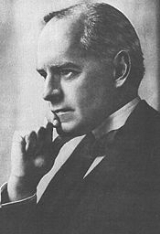
(1906–1921) and its sequels, A Modern Comedy and End of the Chapter. He won the Nobel Prize in Literature
in 1932.
John Galsworthy was born at Kingston Hill in Surrey, England into an established wealthy family, the son of John and Blanche Bailey (née Bartleet) Galsworthy.
The world's a fine place for those who go out to take it; there's lots of unknown stuff' in it yet. I'll fill your lap, my pretty, so full of treasures that you shan't know yourself. A man wasn't meant to sit at home...![]()
Justice is a machine that, when someone has once given it the starting push, rolls on of itself.![]()
When Man evolved Pity, he did a queer thing — deprived himself of the power of living life as it is without wishing it to become something different.![]()
Life was to be lived — not torpidly dozed through in this queer cultured place, where age was in the blood! Life was for love — to be enjoyed!![]()
It isn't enough to love people because they're good to you, or because in some way or other you're going to get something by it. We have to love because we love loving.![]()
Only love makes fruitful the soul. The sense of form that both had in such high degree prevented much demonstration; but to be with him, do things for him, to admire, and credit him with perfection; and, since she could not exactly wear the same clothes or speak in the same clipped, quiet, decisive voice, to dislike the clothes and voices of other men — all this was precious to her beyond everything.![]()
Love! Beyond measure — beyond death — it nearly kills. But one wouldn't have been without it.![]()
Love of beauty is really only the sex instinct, which nothing but complete union satisfies.![]()

